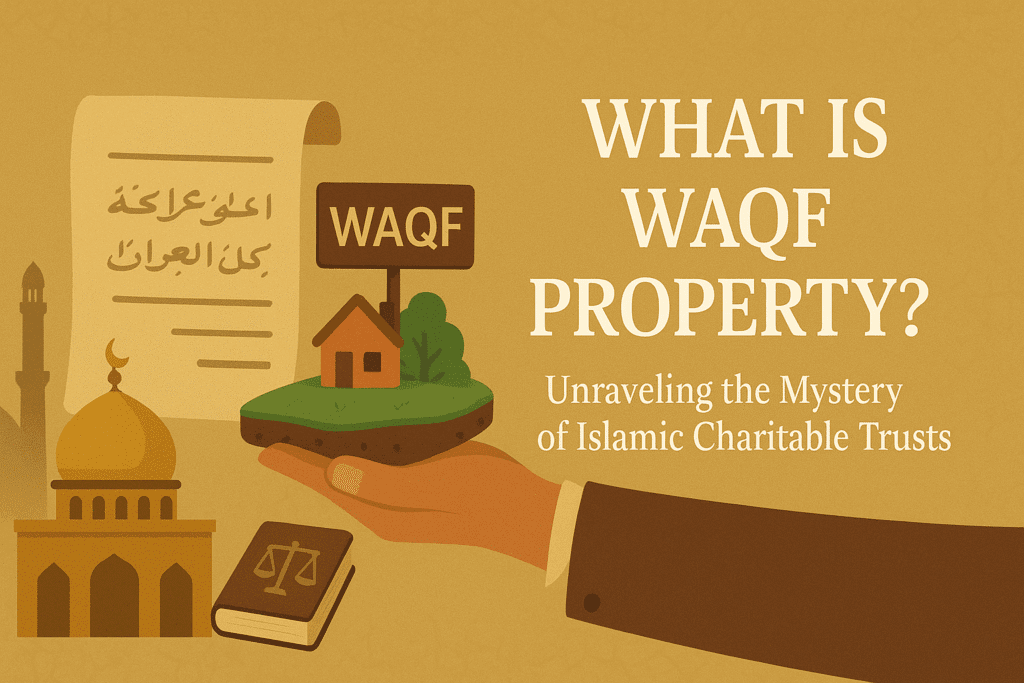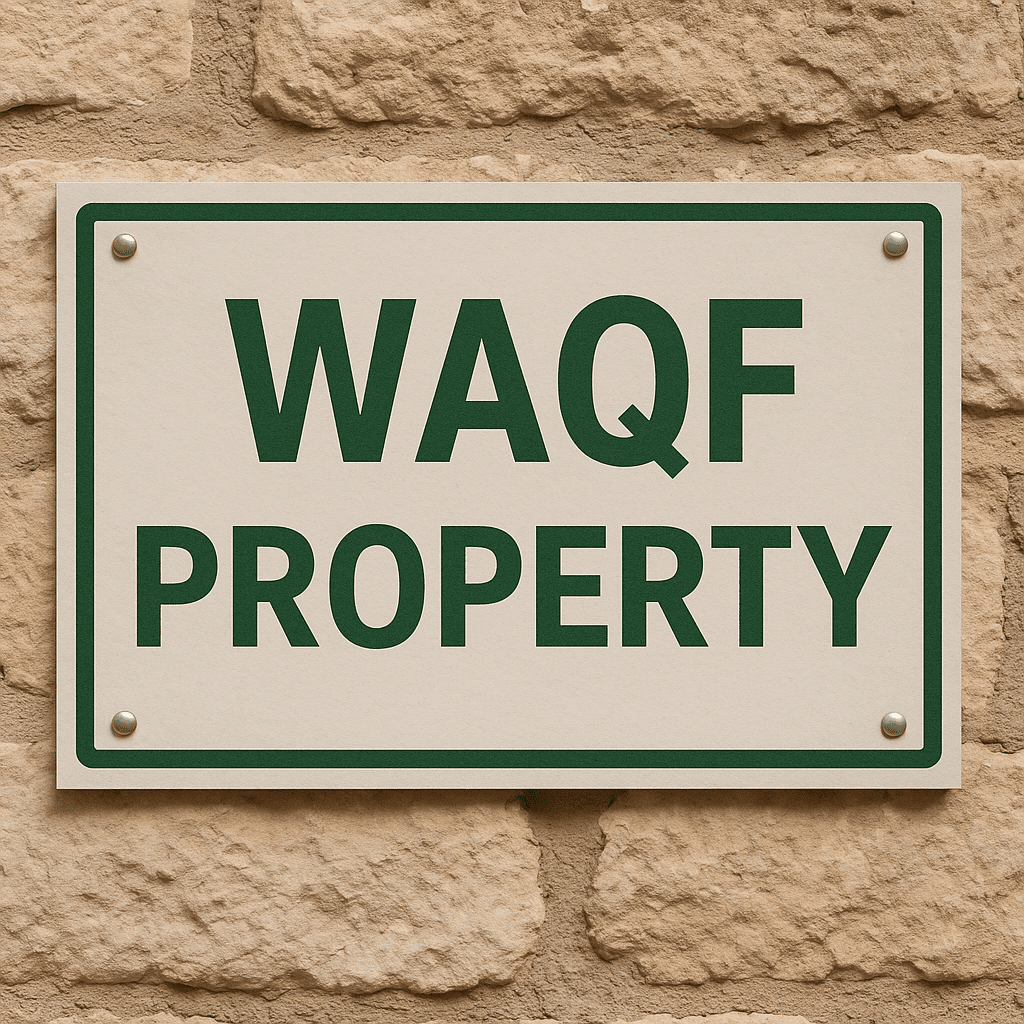In April 2025, the Indian Parliament passed the Waqf (Amendment) Act, introducing significant changes to the management of Muslim charitable endowments. The Act has sparked nationwide debates and legal challenges, particularly concerning provisions that allow non-Muslims to be appointed to Waqf Boards and the potential invalidation of waqf properties previously recognized by court decrees.
The Supreme Court has expressed concerns over certain aspects of the Act, including the removal of ‘waqf by user’—a concept acknowledging properties used for religious purposes over time without formal documentation. Critics argue that this change could lead to the erasure of longstanding religious properties across India.
Amidst these developments, It’s worth exploring What is Waqf Property and the concept of waqf—an Islamic endowment system where property or assets are permanently dedicated to charitable, religious, or public use. The core principle is that the asset itself remains intact forever, while its benefits serve society.
Let’s delve into the spiritual roots of waqf, its historical significance, and how it’s evolving to address contemporary challenges in education, healthcare, and legal governance.

Table of Contents
Understanding What is Waqf Property and Law in India: Historical Context, Recent Amendments, and Contemporary Debates
Waqf, an Islamic endowment of property for religious or charitable purposes, has played a significant role in India’s socio-religious landscape for centuries. The administration and regulation of waqf properties have evolved through various legislative measures, culminating in the Waqf Act of 1995. Recent legislative developments, notably the Waqf (Amendment) Bill, 2024, have sparked widespread discussions and debates across the nation.
Why Waqf Matters Today
Legal Complexity: Involves Shariah, property law, and governance.
Perpetual Charity: Unlike one-time donations, waqf keeps giving for centuries.
Social Safety Net: Funds hospitals, schools, and disaster relief.
Historical Roots: From Medina to Modernity
Origins and Evolution
Have you ever wondered What is Waqf Property? The concept of waqf in India dates back to the 12th century when Muhammad of Ghor dedicated two villages in favor of a congregational mosque in Multan. Over time, the waqf system expanded, encompassing various properties dedicated for religious and charitable purposes. During the British colonial era, the Mussalman Waqf Act of 1923 was enacted to regulate waqf properties. Post-independence, the Waqf Act of 1954 was introduced, later replaced by the more comprehensive Waqf Act of 1995.
Waqf dates back to the Prophet Muhammad (PBUH), who established the first waqf in Medina for a mosque and well. Over centuries, it became the backbone of Islamic civilization:
Fun Fact: The Ottoman Empire’s waqf system funded 35,000+ mosques, schools, and soup kitchens!
| Era | Key Development | Example |
|---|---|---|
| 7th C | First waqf established in Medina | Quba Mosque |
| 10th C | Al-Azhar University funded by waqf | Cairo, Egypt |
| 16th C | Ottoman Sultans built waqf-funded hospitals and roads | Suleymaniye Complex, Istanbul |
| 2020s | Digital waqf platforms and blockchain-based management | Malaysia’s eWaqf |
Global Perspectives: How 4 Countries Do It
| Country | Strengths | Weaknesses | Innovation |
|---|---|---|---|
| India | Huge asset base | Encroachment (40% land) | Waqf 2.0 GIS mapping |
| Malaysia | Cash waqf, e-governance | Underutilized assets | Blockchain donor tracking |
| Egypt | Historic universities | Political interference | AI for asset management |
| Turkey | Corporate waqf | Bureaucratic delays | Business-waqf partnerships |
The 4 Pillars of a Valid Waqf
Declaration (Shighah): A formal statement like “I dedicate this shop as waqf for educating girls.”
Waqif (Donor): Must own the asset and be mentally competent.
Mauquf (Asset): Can be land, cash, shares, or even intellectual property.
Beneficiaries: Clearly defined (e.g., “for orphans in Mumbai”).
Types of Waqf: From Mosques to Cryptocurrency
1. Public Waqf
- Purpose: General welfare (mosques, hospitals).
- Example: A Delhi family dedicates land for a free clinic.
2. Family Waqf (Waqf-ulal-Aulad)
- Purpose: Support descendants first, then charity.
- Legal Tip: India’s 1995 Act recognizes family waqfs but mandates eventual charity transfer.
3. Modern Innovations
Digital Waqf: Blockchain-tracked donations for transparency.
Cash Waqf: Malaysia’s model lets you donate as little as RM 10.
Corporate Waqf: Turkish businesses use profits to fund schools.
How to Create a Waqf: A Step-by-Step Guide
Management Plan: Define how income will be used (e.g., 50% for education).
Declaration: Say “I dedicate this property as waqf for [purpose].”
Registration: File Form I with your State Waqf Board within 30 days.
Mutawalli: Appoint a manager (yourself or a trusted person).
Pro Tip: Hire a lawyer to draft the deed—ambiguous terms often lead to disputes!

The Mutawalli: Guardian of the Waqf
Modern Twist: Apps like WaqfTrack help mutawallis digitize records.
Role: Manage assets, report to the board, and ensure compliance.
Accountability: Can be removed for mismanagement (Section 64).

The Waqf Act of 1995: Key Provisions
The Waqf Act of 1995 serves as the principal legislation governing waqf properties in India. Key features include:
- Definition of Waqf: Permanent dedication of movable or immovable property for purposes recognized by Muslim law as pious, religious, or charitable.
- Establishment of Waqf Boards: Formation of State Waqf Boards and the Central Waqf Council to oversee the administration of waqf properties.
- Registration of Waqf Properties: Mandatory registration of all waqf properties to ensure proper documentation and management.
- Protection Measures: Provisions to prevent unauthorized sale, transfer, or encroachment of waqf properties.
India’s 800,000+ waqf properties (worth ₹1.2 lakh crore) are governed by the Waqf Act, 1995:
Key Features
- Central Waqf Council: Advises the government on policy.
- State Waqf Boards: Register and manage properties.
- Waqf Tribunals: Resolve disputes under Section 83.
Success Stories
COVID Relief: Waqf-funded oxygen plants in Uttar Pradesh.
Waqf 2.0: GIS mapping of 600,000+ properties to combat encroachment.
The Waqf (Amendment) Bill, 2024: An Overview
In 2024, the Indian government introduced the Waqf (Amendment) Bill, aiming to address challenges in the management of waqf properties. The bill proposes several significant changes:
- Inclusion of Non-Muslim Members: Mandates the inclusion of non-Muslim members in State Waqf Boards and the Central Waqf Council to promote diversity and transparency.
- Enhanced Government Oversight: Empowers the government to make decisions regarding the ownership of disputed waqf properties.
- Repeal of Obsolete Legislation: Proposes the repeal of the Mussalman Waqf Act of 1923 to eliminate redundancy and ensure uniformity in waqf administration.
Reasons for the Amendment
The government cites several reasons for the proposed amendments:
- Addressing Corruption: Aims to curb corruption and mismanagement within waqf institutions by introducing greater accountability.
- Improving Transparency: Seeks to enhance transparency in the functioning of waqf boards through diverse representation.
- Streamlining Administration: Intends to modernize and streamline the administration of waqf properties to align with contemporary needs.
Opposition and Controversies
The Waqf (Amendment) Bill has faced criticism from various quarters:
- Concerns Over Autonomy: Opponents argue that the inclusion of non-Muslim members may undermine the autonomy of waqf institutions, which are inherently Islamic in nature.
- Fear of Property Seizure: There are apprehensions that increased government control could lead to the arbitrary seizure of waqf properties, especially those lacking formal documentation.
- Allegations of Targeting Minorities: Some critics view the bill as part of a broader agenda to marginalize the Muslim community and erode their religious rights.
Current Status and Future Implications
As of April 2025, the Waqf (Amendment) Bill has been passed by both houses of Parliament and awaits the President’s assent. The implementation of the bill will have far-reaching implications for the management of waqf properties and the rights of the Muslim community in India.
Landmark Cases Every Lawyer Should Know
1. M Siddiq v. Mahant Suresh Das (2019)
- Issue: Was the Ayodhya site a waqf property?
- Outcome: SC granted 5 acres to Sunni Waqf Board, balancing religious and legal claims.
- Impact: Set precedent for handling interfaith waqf disputes.
2. Kasturi Devi v. Delhi Waqf Board (2023)
- Issue: Illegal shops on waqf land.
- Ruling: High Court ordered eviction, citing Section 54 of the 1995 Act.
3. Baitulmal v. Majlis Agama Islam Selangor (2018)
- Issue: Who controls waqf assets?
- Outcome: Malaysian court upheld state authority, boosting transparency.
Lesson: Malaysia’s eWaqf system reduced fraud by 60%—should India adopt it?
Challenges & Reforms: Fixing a Broken System
5 Major Problems
- Encroachment: 40% of India’s waqf land is illegally occupied.
- Mismanagement: 2013 CAG report found ₹1.2 lakh crore unaccounted.
- Legal Delays: Cases take 5+ years in tribunals.
- Transparency: Manual records invite corruption.
- Awareness: Most Muslims don’t know how to create a waqf.
5 Bold Solutions
- Blockchain: Tamper-proof land records (pilot in Karnataka).
- AI Audits: Detect fraud in financial reports.
- Fast-Track Courts: Resolve disputes in 12 months.
- Awareness Drives: Teach waqf via YouTube and community workshops.
- PPP Models: Let private firms manage waqf hotels/malls for profit-sharing.
Future Trends: AI, Blockchain, and Beyond
- AI Mutawallis: Chatbots that manage small waqfs.
- Waqf NFTs: Digital assets funding real-world projects.
- Global Waqf Fund: Cross-border collaborations for climate projects.
Prediction: By 2030, 30% of waqfs will use blockchain for transparency.
Waqf law in India stands at a crossroads, with recent amendments poised to reshape its administration and governance. While the government’s intent to enhance transparency and efficiency is commendable, it is imperative to ensure that such reforms do not compromise the religious and cultural rights of the communities involved. A balanced approach, incorporating diverse perspectives and safeguarding minority rights, is essential for the equitable management of waqf properties in a pluralistic society like India.
Glossary
Waqf 2.0: India’s digital waqf management initiative.
Mutawalli: Waqf manager.
Shighah: Legal declaration to create waqf.
Mauquf: Dedicated asset.
Waqif: Donor.
FAQs
u003cstrongu003eQ1: What is Waqf Propertyu003c/strongu003e
A waqf property is an asset permanently dedicated by a Muslim for religious, pious, or charitable purposes, as recognized under Islamic law.
u003cstrongu003eQ3: What are the main changes proposed in the Waqf (Amendment) Bill, 2024?u003c/strongu003e
The Waqf (Amendment) Bill, 2024, introduces significant reforms to the management of waqf properties in India. Key changes include:u003cbru003eu003cstrongu003eInclusion of Non-Muslim Membersu003c/strongu003e: The composition of the Central Waqf Council and State Waqf Boards is altered to include non-Muslim members, aiming for broader representation. u003cbru003eu003cstrongu003eRenaming the Actu003c/strongu003e: The Waqf Act, 1995, is proposed to be renamed as the ‘Unified Waqf Management, Empowerment, Efficiency and Development Act, 1995’ to reflect its comprehensive objectives. u003cbru003eu003cstrongu003eClarification on Government Propertiesu003c/strongu003e: The bill specifies that government properties mistakenly recorded as waqf will no longer be considered as such, with procedures outlined for rectification. u003cbru003eu003cstrongu003eIntroduction of an Appellate Systemu003c/strongu003e: An appellate mechanism is introduced, allowing decisions made by Waqf tribunals to be challenged in the High Court within 90 days.u003cbru003eu003cstrongu003eEnhanced Management and Transparencyu003c/strongu003e: Provisions are made for better management of waqf records, stricter penalties for encroachment, and proper utilization of waqf property revenue. u003cbru003eThese reforms aim to enhance transparency, inclusivity, and efficiency in waqf property management. However, they have also sparked debates regarding their implications on religious autonomy and property rights.u003cbru003e👉 For a comprehensive analysis and detailed breakdown of these changes, u003ca class=u0022u0022 href=u0022#u0022u003eread our full blog post on “Understanding the Waqf (Amendment) Bill, 2024”u003c/au003e.
Thanks for taking the time to put this together! I enjoyed reading this and learned something new. Fantastic job covering this topic in such depth! The examples provided make it easy to understand. This post is really informative and provides great insights!
Hmm it appears like your website ate my first comment (it was extremely long) so I guess I’ll just sum it up what I had written and say, I’m thoroughly enjoying your blog. I as well am an aspiring blog writer but I’m still new to everything. Do you have any suggestions for rookie blog writers? I’d really appreciate it.
Hi, I think your website might be having browser compatibility issues. When I look at your website in Ie, it looks fine but when opening in Internet Explorer, it has some overlapping. I just wanted to give you a quick heads up! Other then that, great blog!
Exceptional post but I was wondering if you could write a litte more on this topic? I’d be very thankful if you could elaborate a little bit further. Thanks!